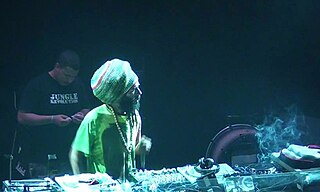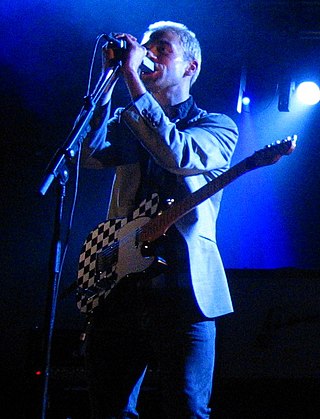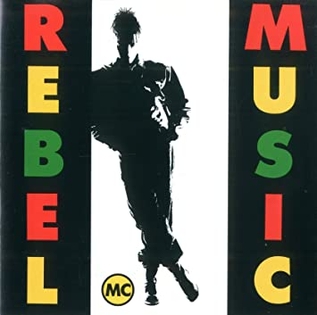Related Research Articles

Bronski Beat were a British synth-pop band formed in 1983 in London, England. The initial lineup, which recorded the majority of their hits, consisted of Jimmy Somerville (vocals), Steve Bronski and Larry Steinbachek. Simon Davolls contributed backing vocals to many songs.

Simply Red are an English soul and pop band formed in Manchester in 1985. Band leader, singer and songwriter Mick Hucknall was the only original member left by the time Simply Red initially disbanded in 2010. They have released thirteen studio albums, from Picture Book (1985) through Time (2023), all of which have peaked within the top ten on the UK Albums Chart; with the albums A New Flame (1989), Stars (1991), Life (1995) and Blue (1998), along with their Greatest Hits (1996) album, reaching number one. Their 1991 album Stars is one of the best-selling albums in the United Kingdom.
The Freestylers are a British electronic music group, consisting of producers Matt Cantor and Aston Harvey. They have released five studio albums and a number of mix compilations for, among others, Fabric and BBC Radio.

Michael Alec Anthony West, better known as Rebel MC and Congo Natty, is a British jungle producer, spiritual chanter and toaster. He has also gone by aliases including Conquering Lion, Blackstar, Tribe of Issachar, Lion of Judah, X Project and Ras Project.
Way Out West are an English electronic music duo comprising Jody Wisternoff and Nick Warren. Originating in Bristol, England, they rose to fame in the 1990s with their UK-charting singles "The Gift" and "Ajare", and their debut studio album Way Out West was released in 1997 to critical and commercial success. Their 2001 follow-up, Intensify, also garnered chart success, along with its singles "The Fall", "Intensify" and "Mindcircus", the latter of which reached number one on the UK Dance Chart.

Michael Barratt, known professionally as Shakin' Stevens, is a Welsh singer and songwriter. He was the UK's biggest-selling singles artist of the 1980s.

Mark Howard James, professionally known as The 45 King and also known as DJ Mark the 45 King, was an American hip hop producer and DJ from The Bronx, New York. He began DJing in the mid-1980s. His pseudonym, the 45 King, came from his ability to make beats using obscure 45 RPM records.
"Don't Let the Stars Get in Your Eyes" is a country song about a man away from home who is worried that his paramour may unwittingly stray from their relationship. It was written by Winston L. Moore and published in 1952. The song has been recorded in many different styles by many performers, with Perry Como's version hitting number 1 in both the US and UK.

Stuart David Price is an English electronic musician, DJ, songwriter, and record producer. His acts include his own band Zoot Woman, Les Rythmes Digitales, Paper Faces, Man with Guitar, Thin White Duke, and the parodic French moniker Jacques Lu Cont.

"Love Don't Live Here Anymore" is a song written by Miles Gregory and originally recorded by Rose Royce. It was produced by former Motown songwriter and producer Norman Whitfield for Whitfield Records. Lead vocals were sung by Gwen Dickey and the song was released as the second single from their third studio album Strikes Again. The song was developed as a result of producer Whitfield's interest to work with Paul Buckmaster, the British arranger and composer. Together they asked songwriter Miles Gregory to write a song for them. Gregory's undergoing medical care for his deteriorating physical health became the inspiration behind the song. "Love Don't Live Here Anymore" incorporated the use of the Pollard Syndrum TwinDrum, and was one of the first songs to effectively use the sound reverbs of the instrument. The song was mainly recorded at music contractor Gene Bianco's house, where Dickey was present during the recording.

"Don't Wanna Lose This Feeling" is a song by Australian singer Dannii Minogue from her fourth studio album, Neon Nights (2003). It was written by the singer with Bruno Alexandre, Matthieu Joly, James Theochari and Camille Troillard of Neimo; and with Minogue's long-time collaborator Terry Ronald.
Age of Chance were a British alternative rock-dance crossover band from Leeds, England, active from 1983 to 1991. They were perhaps most known for their mutant metallic cover of Prince's "Kiss" which topped the UK Indie Chart in 1986, and peaked at No. 50 in the UK Singles Chart in January the following year. Despite signing for major label Virgin, and being favourites with the UK music press, they never enjoyed a major hit in the UK, although "Don't Get Mad… Get Even" reached No. 8 on the US Billboard Hot Dance/Club Play chart.

"Street Tuff" is a song by British producer and toaster Rebel MC and Double Trouble. Released in 1989 by the Desire label as their second single from the debut album, Rebel Music (1990), it became a commercial success and the biggest hit of both performers' careers, peaking at number three on the UK Singles Chart. It is the follow-up to their first hit, "Just Keep Rockin'", which made it into the UK top 20. Additionally, "Street Tuff" was a top-10 hit in Belgium, Greece, the Netherlands, and Switzerland. A music video was also produced to promote the single.

QFX are an electronic dance music group formed in 1992. Their music style is generally a mix of bouncy techno and happy hardcore.

Daniele Gaudi, better known as Gaudi, is an Anglo-Italian musician, solo artist and record producer based in London, who specialises in dub music, electronica, reggae and worldbeat. His distinctive production sound appears in a number of albums nominated for Awards and prizes such as Grammy Award 2019 -Best Reggae Album Of The Year- for Mass Manipulation by Steel Pulse and BBC Radio 3 Awards for World Music 2008 for the album Dub Qawwali by Gaudi & Nusrat Fateh Ali Khan. His music work and contributions have topped international charts such as: Billboard Reggae Chart no.1 with the album Heavy Rain by Lee "Scratch" Perry, Billboard Reggae Chart no.1 with the album Mass Manipulation by Steel Pulse, Billboard Reggae Chart no.1 with the album Vessel of Love by Hollie Cook, Billboard Reggae Chart no.2 with "Rainford" by Lee "Scratch" Perry, UK Dance Chart no.1 with the album "Prism" by The Orb, no.1 with "Jus' Come " by Cool Jack, no.1 in the UK iTunes chart with "Blue Monday" by Dub Pistols, Gaudi, Dubmatix.
Kraak & Smaak is a musical production trio from the town of Leiden, Netherlands, consisting of Oscar de Jong, Mark Kneppers and Wim Plug. The three began recording in 2003. Their first album, titled Boogie Angst, was released in the UK 2006, and they began performing at music festivals and at clubs in the US and UK. Their songs were played on the radio and were used in television shows. Their second album, released in 2008, was titled Plastic People. They won an EBBA. Their third album, Electric Hustle, was released in 2011.

"(We Don't Need This) Fascist Groove Thang" is a song by British synth-pop band Heaven 17. It was their debut single, released on 6 March 1981, and the lead single from their debut studio album, Penthouse and Pavement (1981). It was a minor hit in the UK in 1981, despite being banned by the BBC. It was also a minor dance hit in the US. It developed from an instrumental, "Groove Thang", that Martyn Ware and Ian Craig Marsh created earlier that year for Music for Stowaways, an album they released as British Electric Foundation.
UK garage, abbreviated as UKG, is a genre of electronic dance music which originated in England in the early to mid-1990s. The genre was most clearly inspired by jungle, but also incorporates elements from dance-pop and R&B. It is defined by percussive, shuffled rhythms with syncopated hi-hats, cymbals, and snares, and may include either 4/4 house kick patterns or more irregular "2-step" rhythms. Garage tracks also commonly feature 'chopped up' and time-stretched or pitch-shifted vocal samples complementing the underlying rhythmic structure at a tempo usually around 130 BPM.

Rebel Music is the debut album by British rapper and producer Rebel MC, released in 1990 on Desire Records.
References
- ↑ Lazell, Barry (1997). Indie Hits 1980-1999. Cherry Red Books. ISBN 0-9517206-9-4.
- ↑ Roberts, David (2006). British Hit Singles & Albums (19th ed.). London: Guinness World Records Limited. p. 167. ISBN 1-904994-10-5.
- ↑ "Double Trouble - New Songs, Playlists & Latest News - BBC Music". BBC. Retrieved 14 May 2020.
- ↑ "Trio 'set Menson on fire'". BBC News. 16 November 1999. Retrieved 1 May 2010.
- ↑ "Bubbling Down Under". bubblingdownunder. 22 October 2021. Retrieved 23 October 2021.